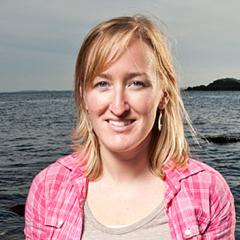McMahan's research featured in series on climate change impacts on Gulf of Maine
Marissa McMahan spent that notoriously warm summer of 2012 lobstering with her father out of Georgetown and encountered a different visitor, a large, stout gray-and-black fish she’d never seen before. The fish, which began turning up in lobster traps up and down the coast, was the black sea bass, a succulent mid-Atlantic species normally unable to tolerate Maine’s cold sea.
A juvenile lobster opens its claws as McMahan reaches for it in Lowell’s Cove. McMahan is a doctoral student at Northeastern University doing her dissertation on how black sea bass are spreading and interacting with lobster and other native species. Photo by Gabe Souza/Staff Photographer
McMahan is now a doctoral student at Northeastern University and doing her dissertation on how black sea bass are spreading and interacting with lobster and other native species. “I don’t see anything to immediately worry about, but I talk to a lot of fishermen south of Cape Cod who think sea bass have played a role in reducing lobster numbers there,” she says. “They tend to open up the sea bass they catch, and they do have a lot of lobsters inside them.”
“It’s a very sought-after and marketable fish, so it could create an economic subsidy where we’re pretty much dependent on one single fishery,” McMahan adds. “But if there are all these other species moving north, we may have a lot more predators on lobsters.”
